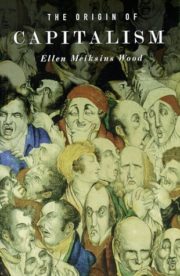Capitalism
In reviewing my past reflections on the state of the world, I see I’ve made frequent references to this book: Ellen Meiksins Wood, The Origin of Capitalism (Monthly Review Press, 1999). So that readers may know what I’m referring to, here is my capsule summary from 2000.
Elegant & persuasive critique of all theories (including Marxist) that assume that capitalism is the natural evolution of any market to which all societies tend once obstacles are removed, or that it emerges as a consequence of demographic and/or technological changes. Markets & trade are not proto-capitalist, operating not on maximizing profit, competition, and compulsion, but on older principle of buying cheap in one market (say, Samarkand) and carrying goods to sell dear in another (say, Constantinople). Capitalism—”a system in which goods and services, down to the most basic necessities of life, are produced for profitable exchange, where even human labor power is a commodity for sale in the market, and where, because all economic actors are dependent on the market, the requirements of competition and profit maximization are the fundamental rules of life”—first emerges in one place only, the English countryside, NOT all of Europe and not in the cities, because of peculiar conditions there: exceptionally wide land holdings by lords, municipalities & other corporate entities with autonomous powers, who could rely on their economic power (to demand rents) and forego use of military power to extract surplus. Reliance on rents that varied according to market conditions, including the productivity of the land, made these landholders interested above all in productivity, thus on organizational & technical improvements, including enclosures. The dispossessed ended up in the cities, especially London, which grew to become the first mass market for cheap consumer goods. English capitalism benefited enormously from its overseas empire, but it grew in the first instance in response to its domestic, mainly London, market, which became so powerful it obliged other countries to modify their economies to serve it (00/3/20).
I find this a persuasive argument. You can find other, more elaborated reviews on the Web. Or read the book.
